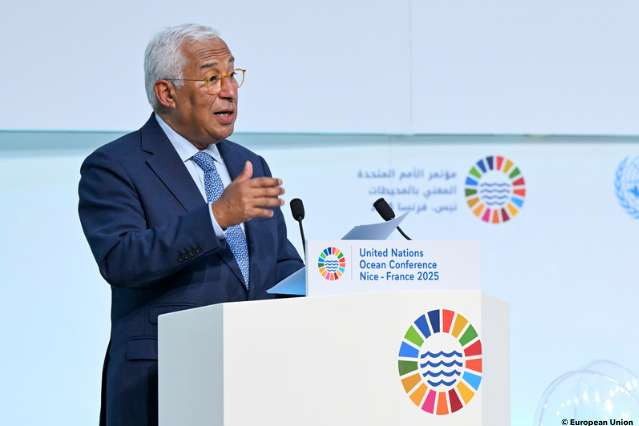
From 9 to 13 June, the United Nations’ Third Ocean Conference convened in Nice, France, where heads of state from fifty countries called for stronger global measures to protect the world’s oceans, taking decisive positions on marine conservation and deep-sea mining. European Commission President Ursula von der Leyen was also in attendance and took the opportunity to announce €1 billion in investments to support ocean conservation, science, and sustainable fishing as part of the European Ocean Pact, an initiative launched just days earlier on 5 June, which aims, among other things, to advance ocean research and innovation.
Also present was President of the Council of the EU António Costa, who called for a moratorium on deep-sea mining, thereby strengthening Europe’s stance on the matter. In his speech, UN Secretary-General António Guterres also addressed this issue, stressing that unregulated deep-sea mining for rare minerals should not proceed without further research into its environmental impact. This stance contrasts with recent positions held by the United States, which was notably absent from the conference and has recently signed an Executive Order promoting deep-sea mining in both US and international waters.
The stakes of the conference were high, taking place against a backdrop of growing urgency as the effects of climate change on oceans continue to worsen and threaten the critical role oceans play as the world’s largest carbon sink, currently absorbing about 30 per cent of all CO₂ emissions. Experts have long warned of the steady decline in ocean health, driven in part by coastal erosion, rising sea levels, overfishing and pollution, all linked to climate change and contributing to accelerating ocean warming and declining oxygen levels.
However, the conference’s outcomes are not binding, with participating members set only to negotiate a political declaration. In spite of this, the final agreement was significantly watered down compared to earlier drafts. A reference to the “triple planetary crisis”, referring to climate change, pollution and biodiversity loss, was removed and the language on decarbonising the shipping sector was markedly weaker. While deep-sea mining is mentioned, the declaration limits itself to calling for more scientific research and the standardisation of rules, falling short of endorsing a moratorium.
One notable outcome of the conference, nonetheless, was the renewed momentum behind the High Seas Treaty, formally known as the Biodiversity Beyond National Jurisdiction (BBNJ) agreement, which aims to designate 30 per cent of international waters as Marine Protected Areas by 2030. The conference encouraged 18 additional countries to ratify the treaty, bringing the total to 51 and edging closer to the required 60 ratifications. With several more expected before the end of the year, the agreement could enter into force as early as next year.